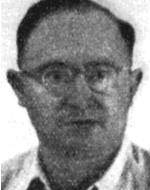Son of Tova and Shmuel, was born on December 13, 1913, in the small settlement of Daughter of Shlomo, and grew up in Zichron Yaakov and Hadera, where his father served as the teacher and principal of the school. With natural love of a village boy, he called the land, flora and fauna, and from his youth he also liked others in his writing – first in the students’ pamphlets and later in the lists he published in the newspapers for youth and adults. After graduating from the elementary school in Hadera, he studied at the Reali School in Haifa and excelled at the Technion and was the first to finish the Engineering-Architects Department with honors. From his youth, he was a member of the Scouts movement and later a guide in the Haifa Wanderers movement. Preached against the participation of his fellow students in the struggle for political parties and for loyalty to the Hebrew language and other national values. In his activity as a mentor for the “Ofarim” (young apprentices) in Sufism, he saw a national-human purpose, a positive influence on shaping the image of a citizen of the future. He authored the Sefer Ha’Ofer, which serves as a good guide book for the instructors and wrote a series of articles on “The Management of Games”. His talents and knowledge in literature, painting and music, natural sciences, mathematics, etc., were used to enrich the spirit of his students in the Scout movement and to be liked by his gentle humor and good friendship. At the same time he and others discovered that despite his excellence in architecture studies, he is a teacher and educator from birth. He was accepted as a mathematics teacher at the agricultural high school in Pardes Hannah. He wrote booklets and exercises in arithmetic, engineering, algebra and trigonometry, which were issued by the Reali School in Haifa and received in other schools. Devoted himself to shaping the spiritual image of his students as a guide, educator and friend alike. He was a veteran Haganah member. During the Second World War, he enlisted in the order of the institutions and served in a British-Jewish unit as a gunner on the Syrian coast. Amazia was sent to courses and specialized in various positions and rose to the rank of sergeant (sergeant) awarded by a non-British was very rare in a British artillery unit. In the process he continued his literary work. On the occasion of his father’s death, he was released from the army and returned to work at the school in Pardes Hannah, teaching exact sciences and Hebrew and running the boarding school. As a scout instructor and educator in a well-known school, despite his great care for order and duty, as a kind and cheerful friend. He helped the apprentices in their studies, in their training in painting and music, in walks and camp life, and was keen to expand their knowledge and spiritual horizons in the circles he conducted for psychology, political economics and the history of art. He wrote stories and poems for children and adults, essays and notes on nature, technique and science in both instructive and amusing manner. Translated from English and Arabic poetry and Tarzan, wrote the book “Sea dwellers,” “lists from the embankment,” memoirs and articles on education, most of which were published in print and some remained handwritten. Upon his declaration of independence, he joined the service and, in accordance with his experience in World War II, was assigned to the Artillery Corps and appointed as a Culture and Welfare Officer and endeavored to provide material and spiritual assistance to the best of his abilities. During the first truce, on the eve of the arrival of the Altalena, he participated in a meeting of staff officers in Jaffa and because of the tension in the situation they were ordered to hurry back to the camp. The jeep, which was raided by the order, was overturned on the Petah Tikva road and he was seriously injured and taken to a hospital. After surgery and three days of painful pain, he died on the 18th of Sivan 5708 (25.6.1948) and was brought to eternal rest in the Nahalat Yitzhak cemetery. After his death he was promoted to captain.
